BC Hydro Power Smart initiates ‘A Conservation Dialogue – Creating a Community of Practice’
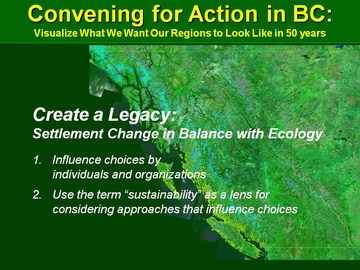
Bringing Together Community Leaders
In May 2010, the BC Hydro Power Smart team convened a select group of community leaders from across the province for a one-day dialogue.
“The intention is to learn with and from each other about what we can do to advance  community based efforts in creating a conservation culture in BC,” stated Pia Nagpal (Program Manager for Community Engagement) in her opening remarks to the group. Of relevance, Pia represents BC Hydro on the Water Sustainability Committee (WSC) of the BC Water & Waste Association. The WSC is providing program delivery services for Convening for Action on Vancouver Island (scroll down to learn more about the relevance).
community based efforts in creating a conservation culture in BC,” stated Pia Nagpal (Program Manager for Community Engagement) in her opening remarks to the group. Of relevance, Pia represents BC Hydro on the Water Sustainability Committee (WSC) of the BC Water & Waste Association. The WSC is providing program delivery services for Convening for Action on Vancouver Island (scroll down to learn more about the relevance).
“You have been identified because we believe that there is much that others could learn from you, given the work that you are doing in your community. Our objective is for participants to work together to co-create a conservation community of practice that connects you and your networks with other like-minded leaders throughout BC to share your successes and challenges in engaging communities.”
“Additional benefits for you include gaining knowledge, insight and tools from the conservation community of practice that will support the work you are doing in your community.”
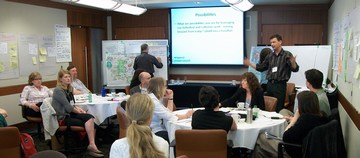
Why this Gathering?
BC Hydro has a mandate and commitment to reduce energy use throughout BC. According to Pia Nagpal, the work of the Power Smart team toward this goal has led them to some key conclusions and assumptions:
- BC Hydro Power Smart defines conservation quite broadly, to include more than just conserving energy or reducing greenhouse gas emissions. This is based on the assumption that energy reduction/GHG reduction has some limitations in its appeal and potential as a goal.
- To achieve an environmentally-sustainable future (e.g. adequately functioning natural systems, including CO2 systems) will require the involvement and commitment of all citizens – it can’t be achieved by large institutions themselves.
- Government and large institutions, while needing to put in place broad policies and support systems, do not have enough influence by themselves to encourage individual behaviour change in support of conservation, at the level that is needed to maintain to adequately conserve our natural systems.
- The nature of individual change that is needed to create a stronger conservation ethic leads itself to a social networks approach – working through local, existing communities (physical or other) and local leaders.
- There are few ‘best practices’ as such for building a conservation ethic (there are lots of good practices) and there is not a ‘program’ approach that can be rolled out. Rather, there is learning that needs to be drawn from communities, and adapted and supported locally.
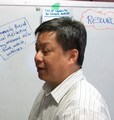 “BC Hydro Power Smart recognizes the need for collaboration among organizations and individuals within the province,” emphasized Jeff Chiu, Manager, Community Network of Power Smart Specialists, in his remarks to the group. “As such, we have coordinated efforts with the Climate Action Secretariat’s office to build this provincial community network that can and will support regional based activities.”
“BC Hydro Power Smart recognizes the need for collaboration among organizations and individuals within the province,” emphasized Jeff Chiu, Manager, Community Network of Power Smart Specialists, in his remarks to the group. “As such, we have coordinated efforts with the Climate Action Secretariat’s office to build this provincial community network that can and will support regional based activities.”
“We feel there is an opportunity to support and strengthen the work of local leaders; we are convinced of this based on our extensive experience in communities across the province. Our long-term goal is build connections between and within communities that result in advancing existing and creating new community-based commitments to actions that support the creation of a conservation culture, and ultimately, conservation itself.”
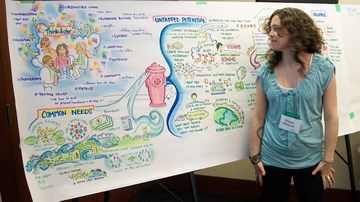
Building on Success
“The May 7 forum was a first step in building what we hope is a vibrant, growing learning network in BC for sharing learning about what creates the conditions for community-based actions that will generate insights, ideas and connections that will make a difference in our energy and carbon consumption,” stated Pia Nagpal when reflecting on the outcomes of the day.
“People see value in building this network – as a community of practice…not as a new organization or association! It is not entirely clear what we call it. What is clear is that it is a network and we do need to come up with a name for it.”
“Next, we will organize a one-day session in October as part of the annual BC Hydro Power Smart Forum. This will provide the opportunity to raise awareness of what can be accomplished through a community-based network. When we reconvene in October, we want to keep the momentum of the group going and to grow it to include more members.”
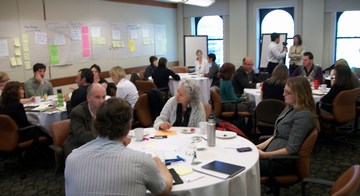
Reflections on a ‘Bottom Up Top Down’ Approach
“I believe this to be an excellent initiative,” observes Eric Bonham, Past-Chair of the Highlands Stewardship Foundation and a former Director in two provincial ministries (Environment, and Municipal Affairs). He is also a founding member of Convening for Action on Vancouver Island, known by the acronym CAVI.
“I have always maintained that without community ‘buy-in’ the usual ‘top down’ approach  will not result in the long term changes necessary to achieve the goal of sustainablity; hence my passion for community engagement through stewardship, etc and the adoption of a ‘bottom-up top down involvement’ approach.”
will not result in the long term changes necessary to achieve the goal of sustainablity; hence my passion for community engagement through stewardship, etc and the adoption of a ‘bottom-up top down involvement’ approach.”
“The CAVI vision is that we will build and/or rebuild our communities in a way that achieves water sustainability over time. How we get there relies on a change in mind-set. The CAVI role is to facilitate that change.”
“I would suggest that any gains we may have made in the CAVI initiative has been due to this appreciation of listening to the community and letting them ‘drive the bus’.”

